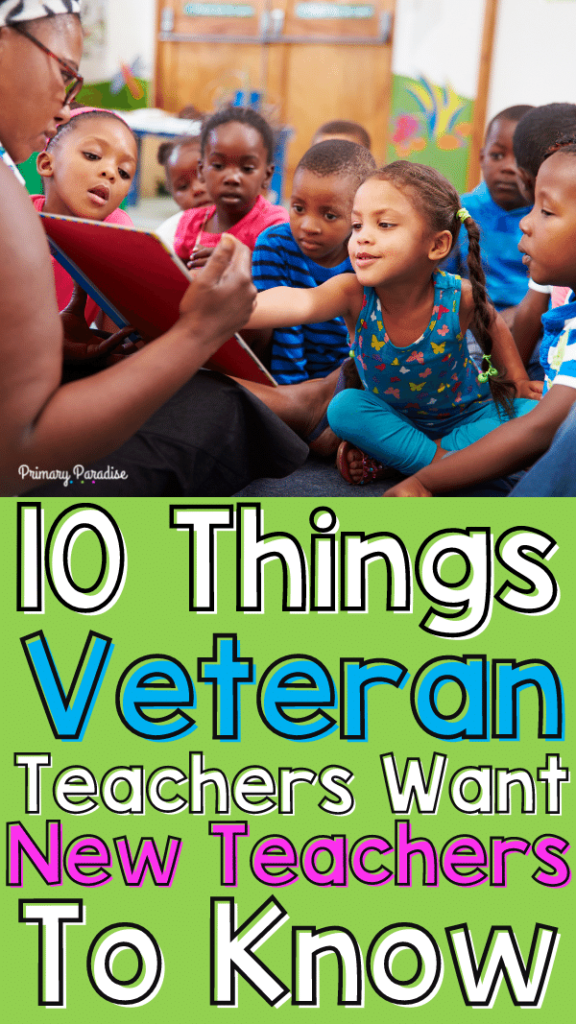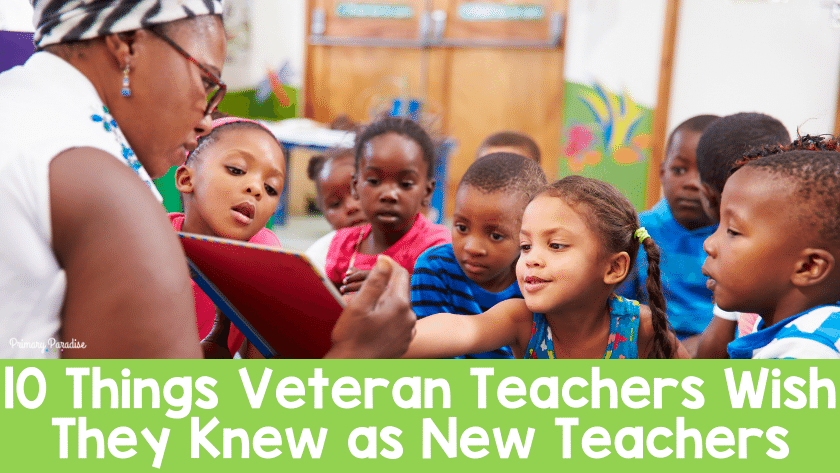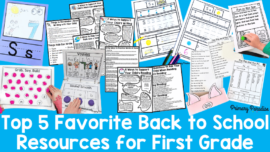First year teachers have a lot to handle, a lot to learn, a lot to do, and it’s well… a lot. The first year of teaching can be very overwhelming, and all teachers make mistakes in their first year. However, hindsight is 20/20, and after some distance from those first few years of teaching, veteran teachers are a wealth of knowledge. I polled a large group of veteran teachers (teachers with 10+ years of experience) and asked what advice for new teachers they wanted to share. Here are 10 things veteran teachers wish they knew as new teachers.
1. Don’t Live at School
In the first year, you’ll never feel like the work is done. It’s really easy to come to school early every day, be the last car in the parking lot at night, and to work every night and on weekends. This is not sustainable, and constantly working isn’t good for you or your students. It’s important to take care of yourself, take time for family, and to step away from school. The thing is, veteran teachers don’t feel like the work is never done. They know the work is never done. But, they also know that it will always be there waiting, but your family, your friends, and your mental health will suffer if you live at school. So, set some boundaries and stick to them as much as possible. If you come early, don’t stay late. If you stay late, don’t also come early. Give yourself space from school so you can be a happier person and teacher.
On the same note, you can’t do it all. Part of a new teacher’s drive to live at school is that they want to make sure they’re doing all of the things. We all have our strengths, and no teacher can do it all. So, if your bulletin board still says “Welcome Back!” in December, it’s not the end of the world.
2. Build Relationships
Getting to know your students is so important for a number of reasons, and building strong relationships also solves a lot of problems before they start. Veteran teachers want new teachers to know that building relationships with students is the first line of defense for dealing with behavior struggles, unengaged students, and creating a comfortable classroom environment. When we take the time to get to know our students- their likes, dislikes, aspirations, triggers, and the things that make them “them”, it does a few things.
- They feel valued and seen.
- We can bring their interests into our lessons.
- They feel safe and comfortable.
Of course, procedures are important, but the real key to an engaged and smoothly running classroom is when teachers take the time to get to know their students and build real relationships. One teacher said, “Learning comes with connections, not lesson plans” and that sums it up perfectly!
3. Don’t Spend So Much Money
Unfortunately new teachers, and honestly teachers in general feel pressured to spend a lot of their own money on their classroom. When I asked veteran teachers what they wished they did differently their first year, an overwhelming number wished they spent less of their own money on their classrooms. Many also mentioned that they wished they had bought less things that they didn’t need. You don’t need to have a perfectly decorated classroom. Your book bins don’t have to be rainbow colors and all match. Although you’ll likely end up spending your own money on your classroom as a new teacher, it’s better to try to see what free things you can find from school, look for free things on Facebook marketplace, and use websites like Donors Choose to acquire things you want. And, if you are going to spend your own money, make sure it’s something that will truly add value to your classroom.
4. There’s No Such Thing As Perfect
Most veteran teachers didn’t have the pressure of trying to teach in the age of Instagram perfect classrooms, but they did want new teachers to know that there’s no such thing as a perfect lesson, classroom, activity, or teacher. Of course, we should try our best, but sometimes we need to accept that “this”, whatever “this” is, is okay. If you spend all of your time trying to be perfect at everything, you’ll master nothing except being very stressed out. Instead, do the best you can and know that perfect is an unrealistic goal.
5. You’ll Make Mistakes, So Learn From Them
I’ve shared before about common first year teacher mistakes. Of course, we try our best to avoid mistakes, but they’re inevitable, especially when you’re a new teacher. But, let’s be clear. All teachers make mistakes, and that’s okay as long as we use them as learning experiences. Instead of getting frustrated and upset when you make a mistake, use it as a change to grow as a teacher. Keep yourself open to learning and evolving your teaching practices. And, if you mishandle a situation with a student, tell them you made a mistake, apologize, and move on. As the cliché saying goes, “Mistakes are proof that you’re trying.”
6. Ask Veteran Teachers for Help
Veteran teachers wanted new teachers to know they’re more than happy to help. If you’re struggling with how to teach something, how to handle a behavior issue, or really anything else, ask a veteran teacher for help. They’ve probably faced whatever you’re dealing with. And, if they don’t have the answer, they can probably help you find it. Once you’ve got a few years under your belt, you can pay it forward to another new teacher. Teachers, for the most part, want to help you succeed because they want your students to succeed.
7. It’s Not a Competition
Here’s another cliché, but accurate saying. Comparison is the thief of joy. Teaching is not a competition, and trying to “keep up” with the teacher next door is exhausting. Maybe you’re not great at changing your bulletin boards (can you tell that I’m personally not great at changing my bulletin boards?), but you rock at teaching students procedures. Instead of looking at your grade partner’s perfect, timely bulletin board in a silent jealous rage, ask her for some tips. Or, take the pressure off of yourself and put your students in charge of your bulletin boards. You are your own unique strengths, just like every other teacher around you. There’s no need to compete.
8. Focus on What’s Important
It’s so easy as a brand new teacher to focus on the things that don’t really matter like a pretty classroom or a catchy morning greeting song, but veteran teachers say to focus on the important things. What are the important things? Here’s what they say.
- Learn the curriculum and standards you need to teach your students.
- Your students!
- Forget flashy lessons. Focus on effective educational practices.
- Do what needs to be done over “fluff”. (Report cards, lesson plans, parent communication)
9. You Don’t Always Have to Stick to the Plan
Sometimes a lesson starts to go a direction that you didn’t plan. Maybe a student asks a question that starts a new discussion, or maybe you start to teach two digital addition only to realize your students still need to work on one digit addition. In those moments, it can be hard to know what to do. Do you tell the student to hold their question until later? Do you plow on with the lesson even though a see of blank faces are starring back at you? The answer is this. Sometimes, you might need to deviate from your lesson plan, and that’s okay.
If students don’t understand the skill they need for the math lesson, it’s time to step back and reteach that. If a student asks a question and your class has a meaningful discussion, that’s time well spent. It’s A-Okay to stray from the lesson plan sometimes. Of course, that should be every single day, but if students are asking real, genuine questions that are worth discussing, or students don’t have the knowledge they need to understand your planned lesson, it’s a great time to improvise a bit.
10. Surround Yourself with the Positive Teachers
Teaching is so much easier when you have other teachers to rely on, but make sure you’re surrounding yourself with the right ones. Make friends with the positive teachers. Ask for help from the teachers who are willing to try new things. Find the teachers who are not speaking negatively about their students. When you surround yourself with positive teachers, they will lift you up instead of dragging you down. They’ll want to cheer you on, support you, and celebrate your success with you. Positively breeds positivity. And, if you are struggling to find positive teachers in your school, you can join our Facebook community for teachers here. It’s a great place to ask for advice for new teachers from veteran teachers.
Keep reading and learning:
- Teacher Interview Tips: How to Land Your Next Teaching Job
- How to Nail Your Next Classroom Observation
- What Teachers Need to Know About Student Privacy
- How to Create a Digital Teaching Portfolio for Free




